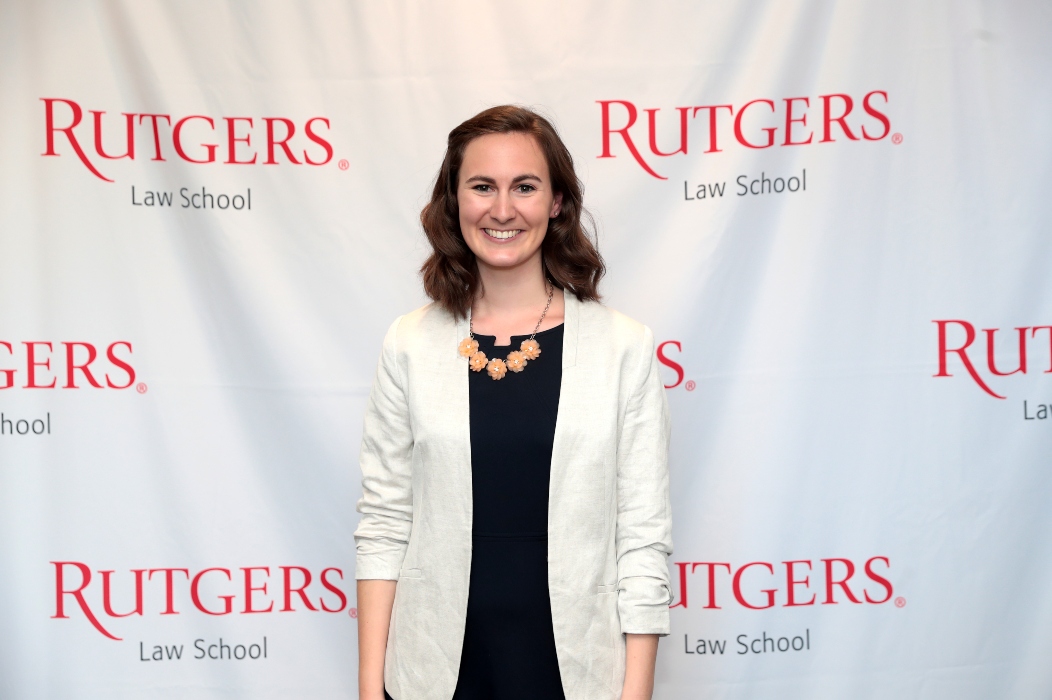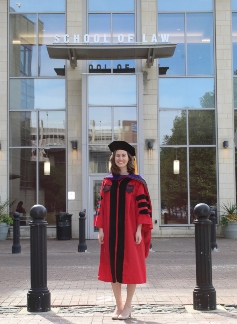A Conversation with Joanna Gardner, English alumna

by Isabelle Rosini (B.A. English '20)
Joanna Gardner graduated from Catholic University in 2013 with a B.A. in English and minor in Spanish. Since then, she has gone on to complete a year of service in Honduras and attend Rutgers Law School. Now, having been selected for a Skadden Fellowship, Joanna is working at HIAS, Pennsylvania, representing immigrants and refugees who have been victims of human trafficking and domestic violence. In this interview, Joanna talks about how her English degree helped her succeed in law school and speak for those can’t speak for themselves.
When you were studying English at Catholic, did you have any idea of what you wanted to do with your degree after graduation?
I majored in English primarily because I love literature. I didn’t know what I wanted to do
when I grew up and certainly could not have imagined doing what I am doing now. Luckily, it turned out that English was the perfect major for me. I loved diving deep into discussion and felt that my studies allowed me to grow not only as a person and a thinker, but as a writer and professional.
What factors and experiences ended up leading you to your current situation, then?
I took a winding path to get to where I am today. I was interested in journalism
throughout college and, for a while, thought that I might pursue that as a career. I was involved with my high school’s newspaper and then wrote for The Tower at Catholic. I doubted, however, whether I had the stamina to be a journalist. While I loved the investigative nature of journalism, I knew that the demands of the job would be more mentally and physically taxing than what I wanted. From there, I started to explore the idea of pursuing a career in communications. I liked the idea of telling a story, whether it be of an individual, a cause, or institution. During my senior year at Catholic, I worked part time for the public affairs office, which gave me my first professional experience in communications. This experience eventually launched me into my first job out of college. But, first, I needed to address my desire to do long-term service in Latin America.
I have always been an enthusiast of the Spanish language, which is why I became a Spanish minor at Catholic. A high school service trip to Peru also cemented my love of the language. Since then, I had been wanting to do long-term service in Latin America so that I could immerse myself in another culture and really learn Spanish well. This led me to do a year of service in Honduras with Amigos de Jesus, a small Catholic non-profit. They run a home in rural Honduras for children who have been abused, neglected, or abandoned. The experience was transformative; even still, I was not entirely sure what I wanted to do when I returned to the states.
It definitely seems like it would be difficult to work a desk job after experiencing life in Honduras. How were you able to connect that experience to your developing professional life back in the states?
When I came back from Honduras, I became aware of a communications job that had opened up at Catholic Charities in Camden, NJ. I worked there as a communicator for about two years and truly put my English degree to use every single day. I had the opportunity to write for Archdiocesan newspapers and write about the work that Catholic Charities was doing at the time.
Communications is a great career choice for English majors--my supervisors were so excited that I could write well! Good writers are in short supply, and I think that this is one of the main reasons why I received a job offer at Catholic Charities.
So, I worked in communications for two years and loved it. In the back of my mind at all
times, though, was my experience in Honduras. I had seen poverty, inequity, and suffering, and I could not seem to shake those images from my mind. Working for Catholic Charities also brought me into contact with refugees and refugee shelters, where I met people with incredibly inspiring stories. I wanted to take on a more active role in their lives. I went back and forth for a while, wrestling with what I was going to do going forward. I thought about doing social work, but didn’t like the fact that I wouldn’t be able to write much anymore. Around the same time that I was dealing with these thoughts, I met some amazing lawyers who were doing public interest and social justice work. I realized that law could combine the two things I wanted most in a career: the ability to make a tangible difference in someone’s life and communication through writing.
So what was your next step? Law school?
Although becoming a lawyer was never on my radar when thinking about possible career paths, I ended up applying to law school. I attended Rutgers Law School in New Jersey. While there, I finally felt like I had found my calling. The skills required by my law curriculum were basically a convergence of all the skills that I had developed at Catholic, abroad, and while working in communications. I absolutely loved it.
I graduated this past May and was awarded a Skadden Fellowship, which is enabling me to pursue public interest law at HIAS, a nonprofit in Philadelphia. I am working as an immigration attorney and represent immigrants and refugees who have been victims of human trafficking or domestic abuse. I could never have imagined that my English degree would take me here, but now that I am here, it all makes sense.

Do you have any advice for English majors who are considering law school? Or grad school in general?
I tell anyone who wants to study law: you should major in English! It is a degree that prepares you to be a law student better than any other degree. Not only does it teach you how to write and think analytically, it also forms your conscience. You can’t read literature and not become more empathetic. Literature exposes you to aspects of the human condition that you wouldn’t have been aware of otherwise. It creates empathy and historical knowledge, both of which the world desperately needs from lawyers.
People told me, “You’re going to learn a whole new way to think, law school changes your thinking.” But, truthfully, the law school way of thinking is essentially what I had already been doing as a student of English Literature. English asks that you sit down with a text and work through it methodically until you are able to convey and understand what lies beneath the surface. I had done this so many times before law school, so I already felt comfortable thinking in the way that law school asks you to think. The sheer volume of work I had to complete in law school was daunting and difficult, but I felt that my English major had equipped me with the skills necessary to get through it all.
I am so lucky to have studied English at Catholic. I think that a lot of schools have moved away from teaching English as a science. But it is a real skill to close read, to really understand a text and not just gloss over what it is saying. I was insecure when I first arrived at law school because so many people had already worked at law firms. It didn’t help that law school is also a very competitive environment. I received my first semester grades, though, and was absolutely stunned: I had done really well! Most tests in law school are essay tests, so I felt well prepared for those. During these tests, you have to apply the facts and make a persuasive argument--basically what an English major does. Being able to write and read well put me leagues ahead of my colleagues who hadn’t studied English or went through an English program like the one at Catholic, where literature is both a science and an art. I feel that the professors in Catholic’s English department pushed me past mediocrity and encouraged me to write better. All of that faith placed in me as an undergrad has instilled in me a desire to put my best effort into my work, no matter what that work may be.

There are many professions out there that need good communicators. There is a lot of hand-wringing today about the upcoming generation that doesn't know how to communicate well apart from the realm of technology and social media. I think that in the professional world, then, there will be a premium placed on people who can communicate well and demonstrate an aptitude to think analytically and critically about communication patterns. The skills gained from an English degree will become more and more indispensable to employers as the iPhone generation grows up. And of course, there are still professions, such as law, that hinge on reading and writing well. It is one of those identifiable, traditional paths in which an English degree might lead you.
Be confident in your degree and get comfortable and confident talking about the marketable skillset that you have acquired. English majors have flexibility in what they can do, which is daunting, but also freeing. One of my friends went to med school after studying English--if you keep an open mind and have confidence in your abilities, your options can be truly unlimited. So, spend some time practicing your elevator pitch because the skills you have attained as an English major are needed and wanted by the world.
But I think it is paramount to remember too that English, and the liberal arts in general, form people, not just professionals. Literature encourages empathy and inspires students to be better people. If you are able to connect and communicate with others in a way that is authentic and engages their common humanity, then your job search will probably go smoothly.
Photo credits: Joanna Gardner
Photo 1: Joanna and fellow Rutgers Law students in Petra during a research trip to Jordan while studying the Syrian refugee crisis (read their report here)
Photo 2: Joanna on graduation day
